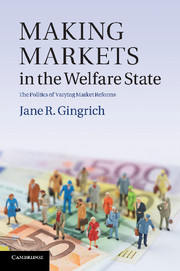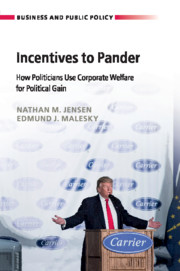Exits, Voices and Social Investment
Citizens’ Reaction to Public Services
$41.99 (C)
Part of Theories of Institutional Design
- Authors:
- Keith Dowding, Australian National University
- Peter John, King's College London
- Date Published: January 2015
- availability: Available
- format: Paperback
- isbn: 9781107484184
$
41.99
(C)
Paperback
Other available formats:
Hardback, eBook
Looking for an examination copy?
This title is not currently available for examination. However, if you are interested in the title for your course we can consider offering an examination copy. To register your interest please contact [email protected] providing details of the course you are teaching.
-
Over fifty years ago, Albert Hirschman argued that dissatisfied consumers could either voice complaint or exit when they were dissatisfied with goods or services. Loyal consumers would voice rather than exit. Hirschman argued that making exit easier from publicly provided services, such as health or education, would reduce voice, taking the richest and most articulate away and this would lead to the deterioration of public services. This book provides the first thorough empirical study of these ideas. Using a modified version of Hirschman's account, examining private and collective voice, and viewing loyalty as a form of social investment, it is grounded on a dedicated five-year panel study of British citizens. Given government policies over the past decade or more which make exit easier from public providers, this is a timely publication for all those who care about the quality of government services.
Read more- The first empirical study of a central social scientific theory of public service provision
- Provides a new understanding of how citizens react to public services
- Shows how citizens can work to improve public services through lobbying and voting
Reviews & endorsements
"This restatement and intensive empirical exploration of Hirschman's classic ideas in the context of public services is not just very welcome as such, but is also an immensely good read." - Stephen Harrison, Honorary Professor of Social Policy, University of Manchester
See more reviews"This book is the culmination of an outstanding record of research by the authors. It is a very important theoretical and empirical contribution to our understanding of how citizens make decisions about public services." - Professor George Boyne, Cardiff Business School, Cardiff University
Customer reviews
Not yet reviewed
Be the first to review
Review was not posted due to profanity
×Product details
- Date Published: January 2015
- format: Paperback
- isbn: 9781107484184
- length: 206 pages
- dimensions: 229 x 152 x 11 mm
- weight: 0.28kg
- contains: 7 b/w illus. 35 tables
- availability: Available
Table of Contents
1. Hirschman's original idea
2. Exits, voices and the object of loyalty
3. Exit, voice, loyalty and neglect
4. The structure of UK public services and some simple relationships
5. Evidence of the major EVL relationships
6. Exit, voice and welfare
Appendix A. Summary of the empirical literature testing EVL
Appendix B. Note on statistical methods
Appendix C. The survey instrument.
Sorry, this resource is locked
Please register or sign in to request access. If you are having problems accessing these resources please email [email protected]
Register Sign in» Proceed
You are now leaving the Cambridge University Press website. Your eBook purchase and download will be completed by our partner www.ebooks.com. Please see the permission section of the www.ebooks.com catalogue page for details of the print & copy limits on our eBooks.
Continue ×Are you sure you want to delete your account?
This cannot be undone.
Thank you for your feedback which will help us improve our service.
If you requested a response, we will make sure to get back to you shortly.
×









